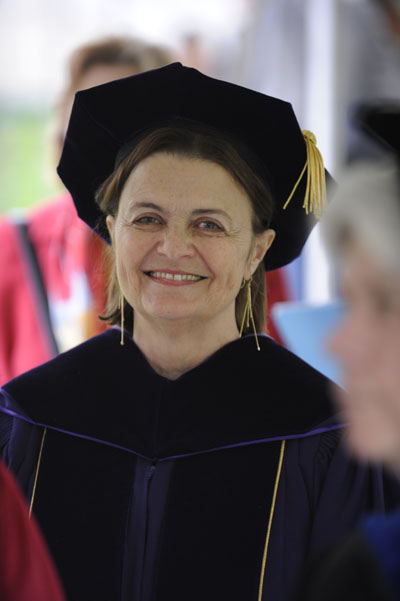Wellesley Inaugurates H. Kim Bottomly as Its 13th President
| For
immediate release: May 9, 2008 |
Contact:
Arlie Corday, acorday@wellesley.edu |
 |
WELLESLEY, Mass. – Surrounded by political, educational and institutional leaders, students, faculty, staff, friends and family, H. Kim Bottomly was installed as Wellesley College’s 13th president during inauguration ceremonies Friday, May 9.
Bottomly, a renowned immunobiologist and former deputy provost at Yale University, came to Wellesley last August. Festivities celebrating her inauguration began on the evening of Thursday, May 8, and continued with special events throughout Friday. Events began with a multifaith celebration and continued with panels of experts focusing on significant breakthroughs made by women and on emerging studies that will shape the future.
The installation of the president included greetings from Massachusetts Gov. Deval L. Patrick and State Rep. Alice Hanlon Peisch, as well as college presidents Susan Hockfield of MIT and Joanne Creighton of Mount Holyoke College, among others.
Among the honors bestowed on Bottomly was the presentation of a second edition of the 1543 scientific revolutionary work by Nicolai Copernicus, which showed that the Earth is not the center of the universe. Presented by Richard French, professor of astronomy, the book appropriately honors Wellesley’s first president from the world of science.
Bottomly spoke about the importance of women’s colleges and a liberal arts education in her inauguration address.
“Wellesley College has remained the same through the years in one most important respect: It has been an intellectual incubator, a scholarly beacon of light for women,” she said. “A Wellesley woman is always a Wellesley woman and always will be. Being a Wellesley woman is a permanent characteristic of mind and spirit.”
Bottomly noted that a liberal arts education allows students to become free citizens of the world.
“In the 21st century, in an increasingly complex, globalizing world, every citizen, in my opinion, needs a liberal education,” Bottomly said. “There is a greater need for education in these crucial skills of freedom than there ever has been.”
Bottomly pointed out that a liberal arts education is the “one big thing” that Wellesley College does, yet it is the most important thing for today’s increasingly complex world.
“In this century, change will be so rapid and all encompassing that specific pragmatic skills learned in college will quickly become obsolete,” she said.
A Montana native, Bottomly graduated from the University of Washington with a degree in zoology and earned her doctorate in biological structure from the University of Washington School of Medicine. Before joining the Yale faculty in 1980, she did postdoctoral work in immunology at the National Institutes of Health.
In her role as deputy provost for science, technology and faculty development at Yale, she initiated and oversaw efforts to enhance faculty career development and was instrumental in Yale’s efforts to recruit and retain women in the sciences and underrepresented minorities in all fields.
A lifelong scientist and educator, her research has focused on the molecular and cellular factors that influence immune responses, particularly how people respond to allergens and why inhaled allergens lead to lung injury.
For more on the inauguration, go to www.wellesley.edu/Inauguration/index.html.
Since 1875, Wellesley College has been a leader in providing an excellent liberal arts education for women who will make a difference in the world. Its 500-acre campus near Boston is home to 2,300 undergraduate students from all 50 states and 68 countries.
###
